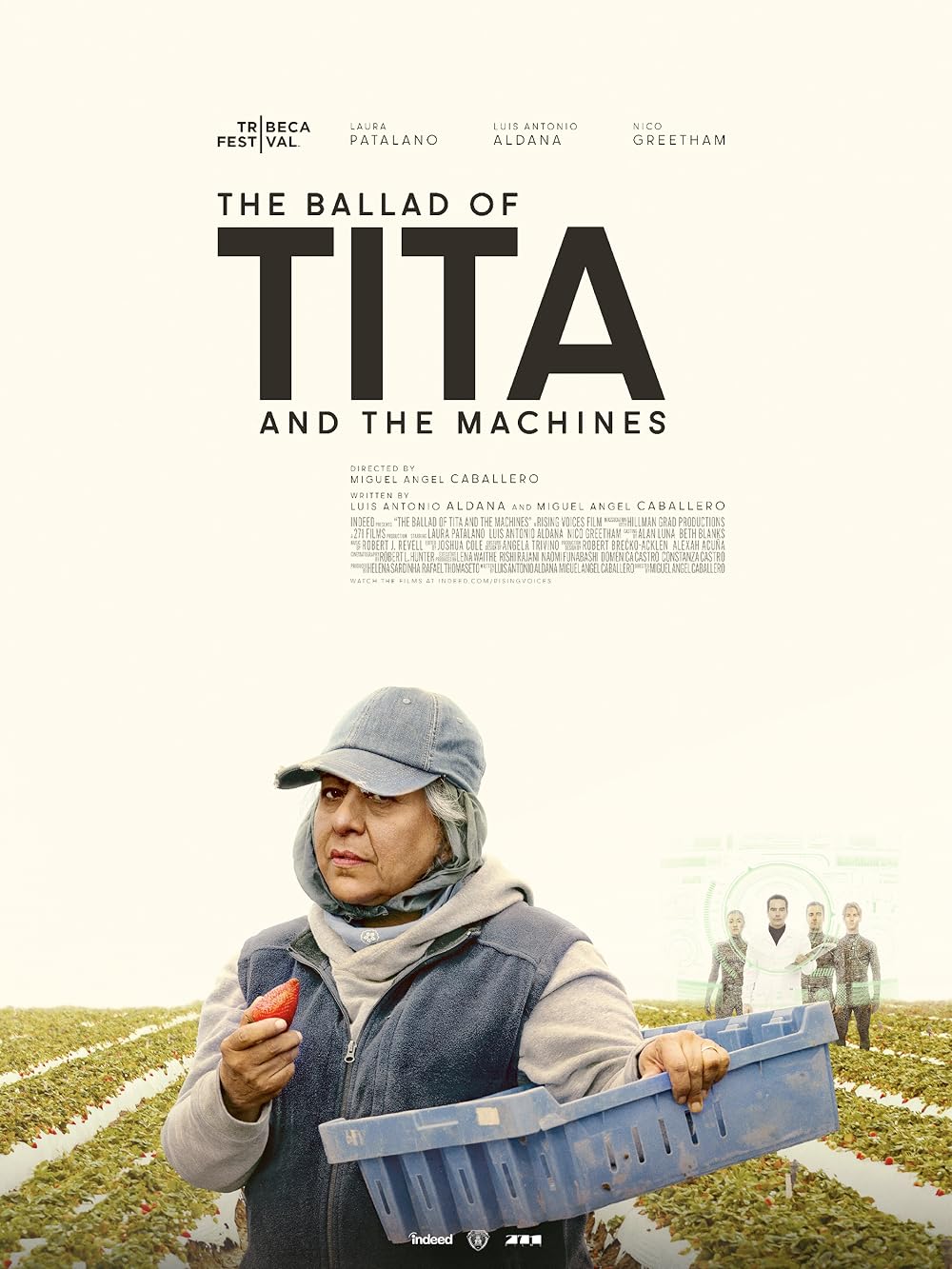
Oscar Qualifying Short Film Review “The Ballad of Tita and the Machines”
WATCH THE TRAILER HERE
First, the Recap:
What we do, especially when it comes to our jobs, so many times helps to define who we are. Now, this can be both healthy and detrimental dependent on the accompanying attitude and impact on the rest of our lives it has. Being exceptional at the tasks we’ve mastered is a point of pride. But, when circumstances take that ability away, or at least sideline us, how much more defeated do we feel when not only our sense of ongoing provision and accomplishment is stolen–but we’re then replaced? Tita (Laura Patalano) has been a highly effective strawberry picker for many years, even in spite of her advancing age. But when an injury puts a hold on this endeavor, the frustrations she soon faces take on more forms than she would have ever conceived–and ushers in a lesson in just how UN-replaceable she might be!
Next, my Mind:
More closely akin to “I, Robot” than “Terminator” while not necessarily going to either of those film’s extremes in their respective depictions of what a future involving AI could become (or possibly IS becoming?? Yikes!), make no mistake there is a deep applicability to be discovered and subsequently get explored through this 14-minute Oscar qualifying short film from writer/director Miguel Angel Caballero, writer Luis Antonio Aldana, producers Helena Sardinha and Rafael Thomaseto, plus executive producers Constanza Castro, Domenica Castro, Rishi Rajani, Naomi Funabashi, and Lena Waithe. The third of a four-film run this critic is reviewing that arrives from the award-winning production house Hillman Grad in conjunction with 271 Films and Indeed Films’ amazing and needed “Rising Voices” initiative, the ongoing overall social and cultural relevancy these films showcase remains a standout facet of the efforts seen to date, and represent the importance of indie films’ ability to raise awareness while still providing top level entertainment accompanied by well-executed, RELATABLE (there that concept is AGAIN) storytelling and character development.
The narrative we’re given to take in here focuses on an older woman’s plight as she faces not only the inevitability of what an aging body can or cannot keep doing, but also a startling realization that there are those out there who truly are attempting to make technology a supposed “perfect” substitution for what is perceived as human frailty–but at what actual cost? As this foundation premise unfolds, the film does a masterful job at exhibiting and fleshing out the unavoidable apprehensions, innate aggravations, misguided assumptions, and utter fallibility that truly unproven tech presents while also very much taking on the more overtly and necessary human side of things via our own fears of becoming obsolete and no longer useful while illustrating the sheer stubbornness and unequivocal strength of willpower and intent when we are certain we can still accomplish what we’ve been adept at for so long and simply REFUSE to give up or give in to others’ judgements and hesitations.
Now, what I also felt is a superbly done aspect here is how deftly the film addresses these elements but does so not JUST with straightforward drama, but with some genuinely hilarious instances that infuse the narrative with a definitive degree of satiric bite, a blatant and purposeful jab AT the whole idea of our over-the-top reliance on technology, which really ends up delivering a highly cathartic series of moments throughout the story that emphasize the need, perhaps, for us to take a step back and re-assess exactly HOW much we REALLY want a machine to even be CONCEIVED as a replacement for good ole fashioned human knowhow and longstanding capacity to overcome obstacles rather than fall victim to the shortcomings of things still IN process of learning the intricacies of who we are AS living beings vs. artificial “replicas”. By the film’s quite wonderfully formulated finale arrives, you as the viewer have chuckled and chided your way through the narrative and the aforementioned thematic forays it has conveyed with what this critic feels will be wholly satisfying, freshly compelling journey.
As I mentioned above and so consistently find I MUST expound on when it comes to the undeniable beauty of indie film’s character-driven format, the acting here paints that unceasing portrait of precisely WHY I adore it so much about the genre–credibly grounded characters. Patalano, in my first time having seen her on screen, is just fantastic on all levels through her title role as Tita, a hard-working but now elderly woman who finds herself in a battle against her own body, time, and the specter of a “successor” for her job when an injury suddenly prevents her from being able to carry out her given task she’s quite adept at. In spite of her protestations and initial attempts to get back at it, her encounters with the literally manufactured “surrogates” vying for her vacated position sends her on a quest to show just how BAD of a decision this would be for the powers that be to take the actions they are.
Watching each circumstance that both uproariously and resoundingly makes the point she’s striving to make more and more, will Tita’s playfully yet intentionally cantankerous demeanor win the day? It’s just a full-out bastion of comedic entertainment mixed with sincere dramatic weight that Patalano brings to the character, winning you over from the very start and throughout the film with her wit and whimsey but also with the poise and affecting emotional energy the story requires. Primary supporting roles arrive first from Luis Antonio Aldana as Casey, the head researcher for the company pushing the AI “replacements” and whose demeanor towards the challenges faced when Tita’s “replacements” aren’t successful and her attitude towards the whole thing sours gets tested and just a tad defensive. Nico Greetham as “Bob”, the first AI Tita must contend with and who does so with defiant and comical results in spite of Bob’s strangely ego-centric confidence.
Cheryl Umana is Lidia, one of Tita’s veteran co-workers who does her best to support her friend during a tumultuous time but also might be trying to advise Tita it could be time to hang it up work-wise–until the AI’s start proving otherwise! Rafael Cobos Delgado is another of Tita’s co-workers Gerardo, who likewise doesn’t really have much positive to say about his friend’s alleged replacement. Rocío López is Gabby, Tita’s granddaughter who also seems to feel it might be time for her grandmother to stop laboring and come live with her and her family, much to Tita’s resistance. Geoffrey Rivas is Joe, Tita’s field boss who has more than his hands full with her insistence on wanting to keep working despite the injury she’s enduring but wanting to overcome. Additional supporting turns are present from Juan Alfonso, Joan Almedilla, and Elia Saldana as fellow manual laborers in other types of jobs that have had run-ins with the AI issue, Arlene Santana is Justine, a lead researcher who ends up eliciting a conspicuously negative reaction from Tita when she is at the research facility where the AI are being worked on.
Finally, Kiara Beltran and Christian Jaime Garcia are two of the other AI that suffer malfunctions during their field tests to replace Tita. So, in total, “The Ballad of Tita and the Machines” is “Black Mirror” lite, a study in what seems to be the inevitable onset of technology being made to stand-in for people while also focusing on the notion of “if it’s not actually broken, don’t try and fix it” in a sobering and convincing manner that should cause us to look at the directions we’re taking in this modern world and re-evaluate the WORTH of PEOPLE, regardless of age, etc and acknowledge that WE were created to be the magnificent machines we are. Therefore, why endeavor to alter that drive to persevere we all possess, especially when the cards are down, and when rising up IS the option we choose to pursue with something these computers don’t have–heart.
STAR RATING (out of 5):
As always, this is all for your consideration and comment. Until next time, thank you for reading!





